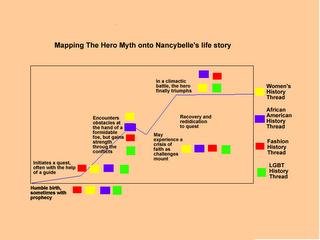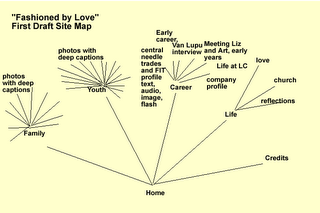As one of my students wrote in my interactive storytelling class this past semester, while
Facade suggests fascinating possibilities for gaming and procedural storytelling, the temptation to "game the game" is very strong.
FACADE STAGEPLAY
Fri Jul 13 15 27 19 2007
TRIP
Where are the new wine glasses?
GRACE
What for?
TRIP
That should be obvious!
GRACE
Oh God, Trip, don't turn this into a big production, please!
TRIP
Jesus Grace, come on, I'm not asking a lot here!
(Adam knocks on the front door.)
(Adam knocks on the front door.)
GRACE
What -- Trip, -- (interrupted)
TRIP
Oh, he's here!
GRACE
What?! You said he's coming an hour from now!
TRIP
No, he's right on time!
(Adam knocks on the front door.)
(Adam knocks on the front door.)
GRACE
Trip...!
(Trip opens the front door.)
TRIP
Adam!!
TRIP
Hey! God it's been so long since we've seen you! How are you doing, man?
ADAM
Hi, how are you?
TRIP
Oh, oh, we're great. You know, with our new apartment and all.
ADAM
I'm okay.
TRIP
Y -- yeah, yeah...
TRIP
Uh, it'll be just a sec while I go get Grace...
TRIP
(unintelligable arguing)
TRIP
(unintelligable arguing)
ADAM
Nice apartment.
TRIP
(unintelligable arguing)
GRACE
Adam,
GRACE
Hi! How are you? God it's been a while! -- (interrupted)
ADAM
Hi Grace
GRACE
H-mmm (happy smile sound) -- (interrupted)
(ADAM kisses grace.)
GRACE
Oh, yes, let's... (polite kiss on cheek)
GRACE
Aren't you sweet.
GRACE
Well, come in, make yourself at home...
GRACE
Yeah, I'm hoping you can help me understand where I went wrong with my new decorating, -- (interrupted)
ADAM
Great view
(Trip closes the front door.)
TRIP
See, I told you he would like it! There's nothing wrong with it.
GRACE
(little sigh)
GRACE
So, about my decorating...
GRACE
(little sigh) With this room I was trying for a kind of post modern style...
TRIP
Well yeah, I think that comes across.
GRACE
but it is clearly just not happening. This is a mess.
TRIP
uhh...
ADAM
It's pretty stark.
GRACE
Ah, yes, I've been waiting for someone to say that!
TRIP
What are you talking about?
GRACE
Trip, he is just being honest about my decorating, which I appreciate.
TRIP
(frustrated sigh) But I still think this looks fine...
ADAM
Why are the walls black?
GRACE
Oh but I liked what you said about my decorating... Besides, I'm redoing it all this week, so...
TRIP
Well, we're all friends here, uh...
GRACE
Adam, seeing you again makes me remember the wonderful times we all used to have. H-mmm (happy smile sound)
TRIP
Ye -- yeah...
ADAM
How about a red couch?
TRIP
Huh, I just realized something.
GRACE
What...
TRIP
There's something we need to celebrate.
GRACE
What, Trip, what?
TRIP
Adam, remember, it was almost exactly ten years ago, tonight, that you introduced us.
TRIP
Senior year of college.
GRACE
Oh... geez...
TRIP
Do you remember that?
ADAM
No
TRIP
Uh, well, all I can say is, tonight means a lot to me, and Grace.
TRIP
(frustrated sigh)
ADAM
That's cool.
(Trip shakes the advice ball.)
TRIP
Oh, uh...
GRACE
That's nice of you, I'm sure Trip's happy to hear that.
ADAM
How about a drink?
TRIP
Oh, yeah, let me fix us all some drinks in a sec!
TRIP
Oh this perfect because I just bought these classy new cocktail shakers we've got to try out.
TRIP
So! Drinks!
TRIP
Anything you want!
TRIP
We need to have something really fun,
ADAM
May I have hot cocoa?
TRIP
like sangria?
TRIP
Ah! I knew it.
TRIP
Perfect!
GRACE
Adam, I think you'd prefer something simple and light, like a nice glass of chardonnay, yes?
TRIP
but... uhh... Grace, come on... -- (interrupted)
ADAM
No, cocoa.
TRIP
Okay! Good! I'll just whip up these bad boys real quick!
GRACE
(little sigh) Trip's favorite pastime is to get the blood alcohol content of his guests higher than his golf score.
TRIP
(quiet humming)
TRIP
What was that?
GRACE
(clears throat)
ADAM
I don't want alcohol.
TRIP
Oh, yeah, you know, I think I'll fix us another drink in not too long...
TRIP
In terms of drinks...
TRIP
Grace, what can I get you to drink tonight? Surprise me.
GRACE
(little sigh) Um... that sounds... nice. I'll have that too.
TRIP
Oh! Good. Okay.
TRIP
Here you go Grace, you get to be the first to drink.
ADAM
So do you still play tennis?
GRACE
(little sigh)
GRACE
So, Adam, -- (interrupted)
PHONE
** RING **
GRACE
Oh, I'll get it --
TRIP
No, no no no, our friend's here, we can let the answering machine get it.
PHONE
** RING **
GRACE
Trip, no, I want --
TRIP
Grace, come on, don't be rude.
TRIP
Besides it's probably some telemarketer trying to sell us another set of timeless New England antiques for the master bathroom, heh, heh. -- (interrupted)
PHONE
** RING **
ADAM
That's not cocoa.
PHONE
** RING **
TRIP
What? Jesus, just -- no, no, I just, I just want to wait for the answering machine...!
(ADAM picks up a player's drink.)
ANSWERING MACHINE
** click **
GRACE
Anyhow, Trip's parents... They're sweet people, really down to earth --
ANSWERING MACHINE
You've reached the fabulous new home of Grace and Trip. Leave us a message!
(ADAM puts down a player's drink.)
TRIP
Uhh, no, they're ignorant, they wouldn't know what a cumberbund from a cucumber.
ANSWERING MACHINE
** beep **
ANSWERING MACHINE
Travis, are you there, it's your mother, I haven't heard from you and Grace in a while,
GRACE
(frustrated sigh)
ANSWERING MACHINE
I'm just calling to find out if you've settled in to your new apartment, that's all...
GRACE
(big sigh)
GRACE
Oh God, Adam, I hope you didn't come here tonight to be entertained...
ANSWERING MACHINE
Give me a call if you're not travelling, I know you're travelling a lot these days.
TRIP
What?
GRACE
Listen to us, we're arguing in front of our friend.
ANSWERING MACHINE
Okay, that's all, bye Travis.
TRIP
Grace, come on, it's not -- (interrupted)
TRIP
Adam, are you -- are you looking for something?
ADAM
Just looking around
TRIP
There's really not much to see in there, it's just the kitchen...
ADAM
Looking for cocoa
ADAM
Are you hiding, Grace?
TRIP
Why don't you come back, be with us here in the living room.
TRIP
Okay, anyway... I forget what we were talking about...
TRIP
Oh, Adam, I thought you might like this photo I just put up from our recent trip -- (interrupted)
ADAM
cocoa
(Grace sips her Grace's drink.)
GRACE
Oh, well, please, go look at Trip's Italy photo...
GRACE
By the way, anybody, join me on the couch if you like.
TRIP
Um... uhh, Now, -- (interrupted)
GRACE
Adam, this is making you uncomfortable. See Trip, was it really worth it to fly us all the way to Italy so you could take that inane picture?
(ADAM sits on the couch.)
(ADAM gets up from the couch.)
GRACE
(little sigh) I'll take the picture down later tonight before I go to bed.
TRIP
Grace...!
TRIP
(short petulant sigh)
TRIP
Adam, this trip to Italy was meant to be our second honeymoon.
GRACE
Oh, was that what it was? Huh, I'm always the last to know.
TRIP
Grace, I wanted us to spend some time together...!
ADAM
sounds as if you have issues
TRIP
What?!
GRACE
Trip, Trip, it's alright, our friend is just giving you a bit of a hard time tonight, you're a man, you can take it.
TRIP
(clears throat) We're so ready for a second round of drinks.
GRACE
Trip thinks carting me off to Europe will, how did you put it, thaw me out a little bit?
ADAM
Hope you work it out
TRIP
H -- hold on...
TRIP
You think we should....
TRIP
not... get divorced...
TRIP
Ha ha, ha, oh, you're -- you're quite the kidder tonight, ha ha ha...
GRACE
Ha, yeah, ha ha...
TRIP
Ha, never afraid to push our buttons, ha ha ha, heh...
ADAM
Wow, there's nothing here!
TRIP
Um, well, hold on, hold on... (clears throat)
GRACE
Okay, well, I was worried there for a bit you were on Trip's side tonight, ha ha.
TRIP
Uhh, you're driving me insane!
ADAM
I am on cocoa's side.
TRIP
Carting you off to Europe... -- (interrupted)
TRIP
Huh? What, what -- what was that?
TRIP
Grace, I do one little thing wrong, and you're cold and distant! Just one thing wrong, that's all it takes!
GRACE
(impatient sigh) Adam, can you believe this?
GRACE
(frustrated sigh)
TRIP
Yeah, Adam, yeah...
TRIP
I know what you'll say...
TRIP
All your goddamn over analytical explanations...!
ADAM
No. You guys don't have cocoa!
GRACE
God, what was it you said? We shouldn't... get divorced...
GRACE
What? I -- what are you saying to me?
TRIP
Adam, where are you going? Don't hide in the kitchen, we need you out here!
TRIP
Okay, you know what, Adam,
TRIP
I need to ask you something.
ADAM
I need cocoa!
GRACE
Trip --
TRIP
Grace, let me ask our guest a question.
TRIP
Adam, hey, quit leaving the room! You can't start this mess and then leave us to fix it!
TRIP
Adam, yes or no...
TRIP
Marriage is about saying yes to the other person, even if you're not sure about it, right?
ADAM
Excuse you!
GRACE
What?
TRIP
I mean, if your husband or wife reaches out to you, you have to reach back, right?
ADAM
I'm not married. I don't know.
TRIP
Look, you don't need answer, I don't need to hear anymore! -- (interrupted)
TRIP
Uhh, I try so hard to reach out to you, Grace, and you reject me! You're cold! You're distant! I can't keep going this way, it's killing me!
GRACE
Oh, don't even...!
ADAM
Do you sleep in the living room?
GRACE
Uhh! Yeah, good, get out of my sight!
GRACE
I can't stand you!
GRACE
Goddammit!
ADAM
Where do you shower?
GRACE
What are you saying? What?
TRIP
What? Are you talking about me in there?
GRACE
What do you care?
ADAM
You don't have a toilet?
GRACE
Adam, -- (interrupted)
GRACE
Adam, (annoyed sigh) Trip is sometimes so...
TRIP
Oh, we're talking about me again, are we?
GRACE
What?
ADAM
No wonder you have trouble!
GRACE
Look, at this point, criticizing me is just going to make it really really bad!
TRIP
Grace, we don't -- we don't have to do this... things are okay, we can just --
GRACE
Adam, I can't stand the pretending anymore... I can't take it!
ADAM
I know. Life without a bathroom!
TRIP
No, Grace, we can... I mean, come on, don't make it out to be so bad...
GRACE
Uhh...
GRACE
Look, let's not focus on just me or you, let's talk about us.
ADAM
Bad! It's potentially fatal!
TRIP
It's so annoying... Grace, why is it that anytime I want to do something nice for you, you resist it?
GRACE
Trip...
TRIP
Like I always have to convince you?
GRACE
Adam, you know, we... uhh...
(ADAM knocks on the front door.)
(ADAM opens the front door.)
TRIP
Adam, where are you going? Don't leave, we need your help here!
ADAM
I need a bathroom
TRIP
Let's keep the focus on us, not just one person.
ADAM
and some cocoa
TRIP
You know, I can't say Grace never acts loving towards me...
TRIP
Adam, She's all over me at our goddamn parties, trying to look good in front of the guests!
(ADAM points to the elevator button.)
(ADAM points to the elevator button.)
TRIP
Adam, -- (interrupted)

Labels: Facade, narrative theory, procedural storytelling






